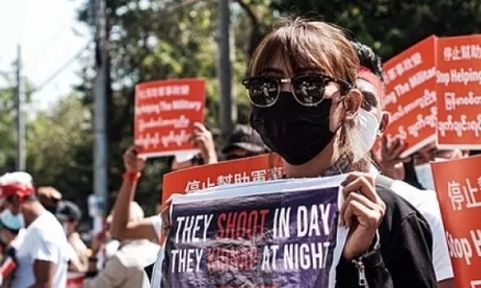Written by a shop steward in a pharmaceutical company and member of Linkse Socialistiche Partij / Parti Socialiste de Lutte (ISA in Belgium).
The effects of the Covid-19 pandemic are made worse by the contradictions in the capitalist production system, but it is also a factor that exacerbates the same contradictions. The tools that are needed to resolve the health crisis are clashing with the logic of competition that is seriously undermining their effectiveness.
The crisis of the authority of science
We have achieved a level of scientific and technical knowledge unparalleled in the history of mankind. This enables us to describe the world around us more accurately, but also to make predictions in a whole range of areas of natural science. Several scientists warned at the time of the emergence of SARS in 2003 that other viruses of the coronaviridae family would appear. Despite these warnings, the logic of saving money has led to a reduction in research budgets on these issues. In Belgium, there was even the destruction of the strategic stocks of masks that became badly needed at the start of this crisis.
In its ascendancy, capitalism relied on the development of science and technology in its fight against the old regime, feudalism. The bourgeois class wanted to subject everything to the rule of reason. Philosophies such as positivism in the 19th century were based on a total and idealistic dependence on science and its development in order to solve all of humanity’s problems. Today we are a long way from that period.
Scientific truth is seen by part of the bourgeoisie as an obstacle to the accumulation of capital. That is how we should understand climate denials and some other views of populists such as Trump.
The crisis of authority that now affects all civil institutions, the parties, media, judiciary and parliamentary democracy, also has an impact on science and all those who represent it. There have been demonstrations against face masks in several countries. On social media, pre-existing anti-vaccination groups have found a second breath around the idea that a future vaccine against Covid-19 would contain a chip that would respond to 5G networks in order to detect people and monitor their activities. This kind of irrational discourse is, of course, a problem in a serious health crisis. It is a result of the fact that bourgeois arguments are not credible and, moreover, undermine capitalism itself, assisted by certain strata of the bourgeoisie who, following the example of alt-right in the US, defend such things as “post-truth” or “alternative facts.”
Vaccine: competition rather than cooperation
On 31 July 2020, the World Health Organisation followed up 165 research projects seeking a possible vaccine against the coronavirus. Of these, 26 were in a clinical phase, which means that they are being tested on humans. Five were in the final stage of testing needed before an application for marketing authorisation can be submitted. This race for a vaccine is clearly a subject of much speculation.
One of the companies in the race is the biotech company Moderna. That company now has a value of $US 30 billion, in 2019 it had a turnover of less than $US 60 million. For some capitalists, the crisis is an opportunity to get a return on their investment. It means that vaccines are seen merely as a commodity and not as a necessary public health tool. This arouses distrust among patients and, at the same time, leads to a waste of resources and time that can be put to better use through cooperation. After all, science advances above all through transparent, collective and open discussion of insights and results.
Parallel to and dependent on economic competition between companies in the pharmaceutical sector, there is competition between economic blocs. Since the beginning of the crisis, each state has tried to put itself forward as the one best placed to manage the crisis. Discussions on counting methods and permitted holiday zones are linked to this.
At the beginning of the pandemic, some states tried to shift full responsibility onto China, which, for its part, tried to minimise the number of cases in order not to lose even more authority among the population. Trump withdrew American payments to the World Health Organisation (WHO) on the grounds that the Ethiopian president of the institution was too close to the Chinese regime.
Trade tensions in the world economy have also weighed on the response to the crisis. In the search for a vaccine, every economic bloc is making an effort. Russia announced that it will distribute a vaccine this autumn: Sputnik V. Each economic bloc is encouraging its own pharmaceutical industry to come up with a vaccine as soon as possible, but also to secure supplies for its own population.
In this race, the only ones who will win are the shareholders who choose the right company on which to gamble. It is ironic that they win, because they are not the ones doing the work. The workload in the research teams is intense and, once a vaccine is available, the workload in the production facilities will be greatly increased in order to produce at the lowest possible cost. Personnel in the sector have to organise themselves so as not to be confronted with crisis legislation, which drastically worsens working conditions. In order to maximise production, there is a risk of a sharp increase in flexibility and the use of temporary staff, instead of the employment of sufficient workers on decent contracts.
The answer will only be effective if it is democratically planned and controlled …
We have all the means to deal with this pandemic. It is a question of adapting everything to social needs. All day long we hear or read on television, social networks or in newspapers how this crisis is affecting our lives. At school, at work, in our leisure time, in our family and private lives, everything has been turned upside down by the crisis. That is why we should have taken the necessary measures. A pandemic of this kind requires the mobilisation of all resources needed to combat it. It was possible to avoid or limit a drastic lock-down. This could have been ensured by massive tests on at-risk groups and in public places.
We do not know when an effective vaccine will be available, but we can now plan certain things. How can we produce vaccines in sufficient quantities? Do we have the necessary infrastructure? Do we need to build anything extra? Knowing that a pandemic is being fought on a global scale, we need to think about how we can produce enough vaccines on a global scale. Today, only the nationalisation of the multinational pharmaceutical companies can enable us to meet this need.
These companies already have global supply and distribution chains and trained personnel. With the additional workload, it will be necessary to employ people, but on stable contracts and under good conditions. The introduction of production automation should be used to ensure a sustainable human work rhythm.
Such necessary measures can, of course, only be implemented on the basis of a social movement that demands control of production and the distribution of wealth for the majority of the population. A movement involving the majority of the population is also the best weapon against those who spread all kinds of irrational theories for their own personal glory.
That is what Marxists working in the pharmaceutical sector fight for. Join us!



